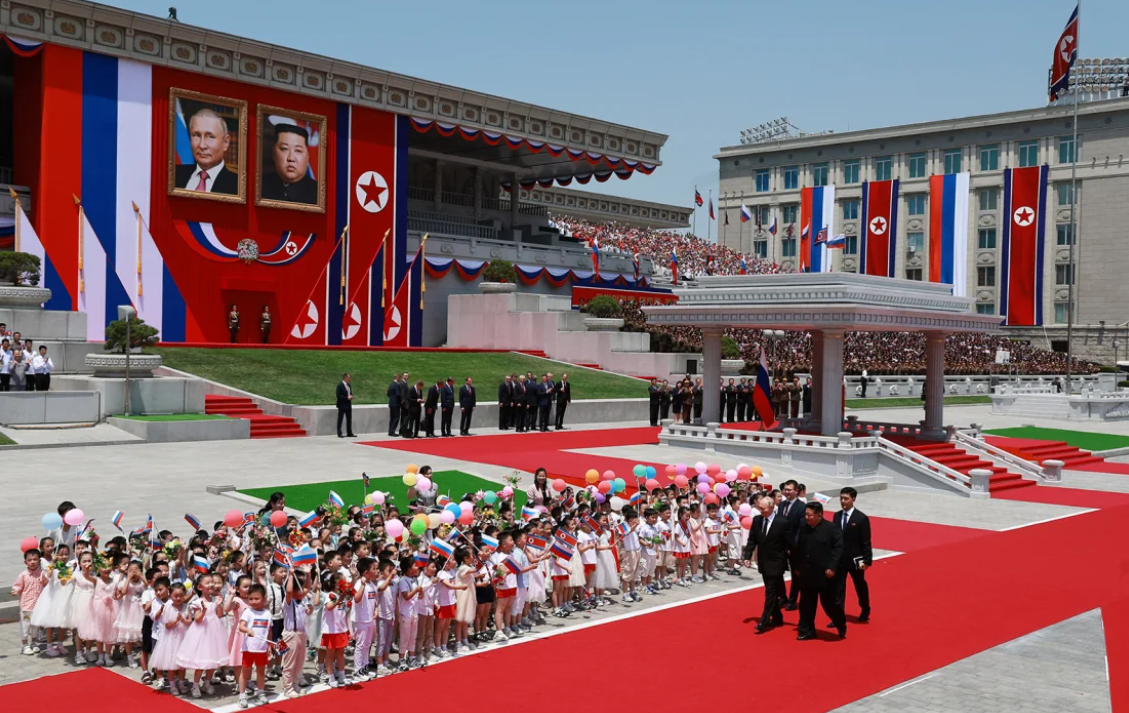Vladimir Putin’s first visit to North Korea in nearly 25 years has garnered global attention. Russia was aware of the scrutiny from the West and made no effort to hide its intentions.
Lately, Putin has been excluded from many international gatherings and faces the threat of arrest in numerous countries due to an International Criminal Court warrant linked to his invasion of Ukraine.
However, on Wednesday, the increasingly isolated Russian president received a warm reception in Pyongyang. Children waved Russian flags as giant pictures of Putin adorned one side of Kim Il Sung Square.
Russian state media broadcasted footage showing posters of the Kremlin leader lining the streets, signaling to the world that Putin is far from isolated and that his influence is still valued in certain regions.
In North Korea, unlike in China, Putin is not seen as a lesser partner.
The rhetoric of both leaders and the “comprehensive strategic partnership pact” they signed emphasized their goal to unite against what Putin termed “the imperialist policy of the United States and its satellites.”
This pact reportedly includes a clause similar to NATO’s Article V, which Putin claims provides “for the provision of mutual assistance in the event of aggression against one of the parties to this agreement.”
Putin accused the West of violating its “international responsibilities” by supplying F-16s and other weapons to Ukraine, asserting that Russia might “develop military-technical cooperation with the DPRK in accordance with the document signed today.”
In essence, Russia and North Korea are pledging military support to each other amid escalating tensions with their neighbors and the West, raising significant questions.
Does this collective defense pact extend Russia’s nuclear deterrent to North Korea?
Will it involve joint military drills or the establishment of joint forces to protect their borders?
Could other nations join this pact in the future?


Neither Putin nor Kim provided specific details.
“In a sense, this is laying out what they have been already building up in the recent months and years,” said Jo Bee-yun, Associate Research Fellow at the Korea Institute for Defense Analyses.
“But definitely, I would say this clause is very alarming.”
“Because it’s at the initial stage, depending on how things roll out, they would, if I were them, they would interpret the clause according to their needs.”
A more immediate concern is that “military-technical cooperation” could result in more shells and missiles being supplied from North Korean factories to the front lines in Ukraine.
Both Moscow and Pyongyang have denied this, but Russia, having previously supported UN sanctions against North Korea exporting weapons, used this opportunity to again criticize “politically motivated sanctions.”
In March, Russia used its position on the UN Security Council to end the mandate of a panel monitoring North Korean sanctions violations.
Russian state media capitalized on this to taunt the West.
“The West admits terrible concern around Putin’s visit to North Korea,” read a headline in Moskovsky Komsomolets, a national daily newspaper.
“What difference does it make to the Americans if we talk to our neighbor [North Korea], why are you getting so worked up?” jeered top Kremlin propagandist Vladimir Solovyov on his Tuesday night talk show, adding ominously, “we are already living in a Third World War.”
This comment hints at another aspect of Moscow’s strategy: Russia may have concluded that its own nuclear threats are no longer sufficient to deter the West from increasing aid to Ukraine.
The meeting with Kim Jong Un and the “breakthrough” pact coincided with the arrival of long-awaited US weapons in Ukraine and the lifting of some restrictions on their use against Russia.
Russia also requires weapons to continue its strategy of wearing down Ukraine into submission.
While it might not be in Russia’s strategic interest to explicitly fund or help expand North Korea’s nuclear arsenal and risk upsetting China, it may want the West to believe it’s willing to do so.
Families Demand Historic $25 Billion Fine For Boeing Over 737 Max Crashes

